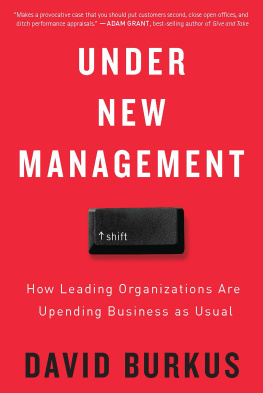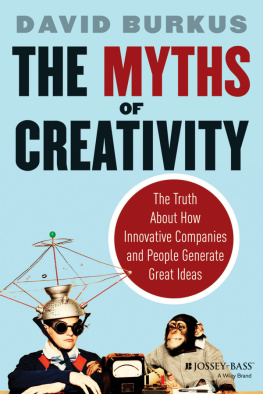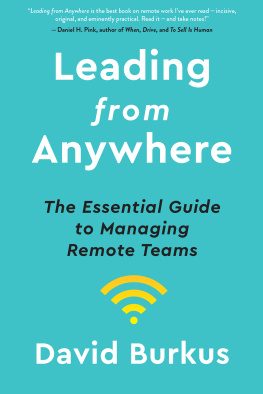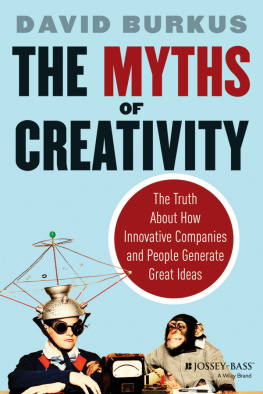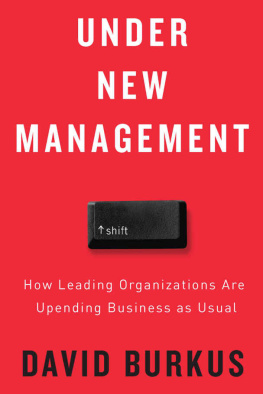Copyright 2016 by David Burkus
All rights reserved
For information about permission to reproduce selections from this book, write to or to Permissions, Houghton Mifflin Harcourt Publishing Company, 3 Park Avenue, 19th Floor, New York, New York 10016.
www.hmhco.com
The Library of Congress has cataloged the print edition as follows:
Names: Burkus, David, (date) author.
Title: Under new management : how leading organizations are upending business as usual / David Burkus.
Description: Boston : Houghton Mifflin Harcourt, 2016. Includes bibliographical references and index.
Identifiers: LCCN 2015037017 | ISBN 9780544630970 (hardcover) ISBN 9780544631601 (ebook) | ISBN 9780544842151 (pbk. (international edition))
Subjects: LCSH : ManagementCase studies. | ManagementEmployee participationCase studies.
Classification: LCC HD 31.2 . B 87 2016 | DDC 658dc23
LC record available at http://lccn.loc.gov/2015037017
Cover design by David Drummond
v1.0316
To Lincoln and Harrison
Introduction:
Management Needs New Management
In 1898 the Bethlehem Iron Company was in trouble. The company was facing increased competition and losing ground quickly. Besides its misnomer company name (they actually produced steel), its share of the market as a supplier to the railroad industry was rapidly being grabbed by a growing number of Pittsburgh-based firms, including the Carnegie Steel Company.
To try to turn their fortunes around, Bethlehem Irons leaders hired a middle-aged intellectual with an interesting past. He had studied at the renowned preparatory school Phillips Exeter Academy, with the intention of continuing his education at Harvard. But after passing the Harvard entrance exam with honors, he decided against attending. Instead, in a somewhat stunning move, he became a machinist and worked his way up the factory floor to become foreman. He studied mechanical engineering by night while he continued to work as both a laborer and a foreman by day. By 1898, having begun to merge his intellectual knowledge with his laborers experience, he decided to become a consultant.
His name was Frederick Winslow Taylor.
Taylor brought to Bethlehem Iron a new set of tools for maximizing the efficiency of the steelworks. His method was to systematically study every task in the system of production, then eliminate unnecessary tasks and train laborers in the detailed and specific way to execute each task. After perfecting the system and the tasks, Taylor sought to perfect the laborers themselves by removing hourly wages and assigning a specific pay rate to the segment of work for which they were personally responsible.
This piece-rate system was seen as a way to increase the speed of production and decrease loafing among workers. Taylor himself would repeat that there was not a single manual laborer who does not devote a considerable part of his time to studying just how slowly he can work and still convince his employer that he is going at a good pace. It was Taylors role as a consultant to study what that good pace actually was.
Taylor would also study the tools of production. In one instance, he famously asserted that the most effective load a worker should carry in a shovel was 21.5 pounds, but that workers often used the same shovel regardless of the material being loaded (and hence the weight often varied in the load they were actually carrying). Taylor found or designed new shovels for each material that would scoop exactly 21.5 pounds. Taylor viewed the discovery of such specific levels of efficiency as out of the intellectual reach of the common laborer; the ideal worker, in his mind, was simply an unskilled cog in the larger machine, trained to do just one task and rewarded when he performed that task optimally. Taylor asserted that it is only through enforced standardization of methods, enforced adoption of the best implements and working conditions, and enforced cooperation that this faster work can be assured. And the duty of enforcing the adoption of standards and enforcing this cooperation rests with the management alone. In short, Taylor didnt need the minds of laborers; he only needed their bodies.
Not surprisingly, his ideas werent easily accepted by the laborers themselves. Taylors rigid methods had indeed increased production, but those changes also caused strife among laborers and managers who were used to the way they had been working. By 1901 Taylor was forced to leave Bethlehem Iron after disputes with other managers. But he didnt walk away from his principles of scientific management. Instead, he began spreading his ideas as far as he could, and he would eventually see them readily adopted.
Taylors concept of scientific management came at exactly the right time. Just before the turn of the nineteenth century, there had rarely been a need for smart managers to supervise large groups of unskilled laborers. In 1790, 90 percent of the working population in the United States lived on farms, producing food for themselves but also items like clothing, furniture, soap, and candles. What little commercial manufacturing existed was done by skilled artisans who worked in small shops that often doubled as their homes.
The industrial revolution changed all of that. As new machines were invented and ways to power those machines were discovered, the speed of production for various tasks quickened. Between 1890, just before Taylor began working with Bethlehem Iron, and 1958, manufacturing output per labor-hour in the United States grew almost fivefold (and it has kept growing rapidly ever since). Products that used to be created by lone artisans were now mass-produced in large factories. Those factories needed employees. Those employees needed managers. Those managers needed tools.
Frederick Winslow Taylor provided the tools to manage the people in those factories. His ideas dramatically increased the speed and efficiency of production and helped companies grow. There are even those who say that the amazing economic growth of the twentieth century stems largely from Taylors management ideas and the ideas they inspired. As the majority of the population moved from farm work to factory work, the style of management that fueled that growth became the unquestioned standardthe universal toolbox. Over time, others would build on Taylors work and add more tools that built off his ideas (or sometimes were positioned as replacements for Taylors ideas), thus becoming part of the toolbox used to manage large-scale industrial firms. Even the most drastic departures from Taylors ideas were still tools to be used by the managers and leaders of large-scale, largely industrial firms.
Taylors public lectures were eventually published as books. The most popular, Principles of Scientific Management, was published in 1911, and sales quickly took off around the country and the world, even as far as Japan. System would grow in popularity and eventually take the new title of Businessweek.
Universities started business schools to train managers and future managers on how to use the tools of scientific management to maximize production and minimize costs. Taylor even joined one, becoming a professor at the Tuck School of Business at prestigious Dartmouth College. Companies began to benchmark their practices by comparing their use of these tools to how the industry leaders were using them. Amazingly, many of these basic management tools are still taught at business schools and benchmarked by managers. After all, these tools got us to where we are today.


